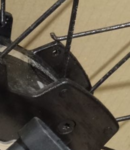bazzapage
Active Member
I've broken a few spokes now - I don't think I am especially hard on wheels at 80kg (175lb). When I look at the spokes (which all break at the same place) I can't help but think back on my undergraduate engineering days, learning about stresses and strains. The spokes used are think in gauge which along with short length makes the wheel rigid. But then the spoke gets thinner at the thread end, transferring almost ALL the stress on this weak point.
And this folks, is why butted spokes were invented. Thinner in the middle to provide some elasticity, and thicker at the ends to provide strength.
So I think the wheel needs a spoke with a thicker gauge nipple. Am I wrong?


